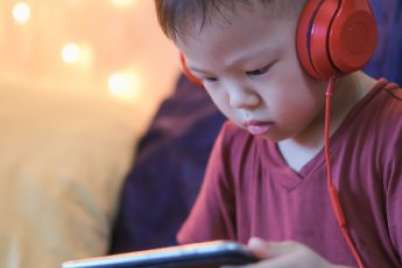
Why parents should be mindful of their own screen time
Managing screen time isn’t just something parents need to do for their kids: it’s also something we need to do for ourselves.
Concern is growing about the impacts of “technoference” on parenting, as evidence mounts that parents who are distracted by phones and other digital devices interact less with their kids. Parental technoference has also been linked to greater behaviour problems in children, including tantrums, sadness, withdrawal, and hyperactivity.
Technology is all around us—most of us carry mobile devices wherever we go—making it increasingly difficult to disconnect from online distractions. The blank face we show our children when we’re distracted with our devices has long been demonstrated to affect even very young babies, as demonstrated in this 2007 video of the “still face” experiment by Dr. Edward Tronick of Harvard University:
Although guidelines exist, most modern families find it challenging to limit screen time—both for children and adults.
And there are many statistics that illustrate this. In 2019, a study published in JAMA Pediatrics journal found that only 20 percent of two-year-olds and five percent of three-year-olds were meeting screen time guidelines for their age group.
Related read: How to keep screen time in check
And, increasingly, many adults are realizing that they’re also spending too much time on screens, often at the expense of time with friends and family, sleep, and activities they enjoy. One recent survey found that more than half of parents have been asked by their children to put their phones away:
The survey … also found that a staggering 69% of parents feel ‘addicted’ to their smartphones. In fact, most parents are so enthralled with their pocket-sized devices that they only spend 24 minutes more per day with their children as they do with their phone! On average, respondents spend two hours and 17 minutes on their phone each day, and two hours and 41 minutes of screen-free time with their children on a daily basis.
An ABC News segment on screen time reported that the average adult unlocks their phone eighty times per day—something our kids can’t help but notice. In a recorded experiment, it took just 15 seconds for a toddler to notice his mom’s distraction.
While the battle for attention happens all day long, the devices we use are engineered to keep us looking. According to tech experts, popular apps are designed without cues to limit or stop scrolling. In fact, these experts reveal that the way you swipe and pause on a screen provides data to the device about your personality, preferences, and current psychological state. This information is then used to keep you looking down instead of engaging in real face time.
The single best thing parents can do to ensure children develop healthy screen time habits is to model healthy habits themselves. Here are a few ways to do that:
- Make a point of putting your phone away during mealtimes, and when spending quality time together as a family.
- Talk to your kids about what you’re doing when you’re on your phone (explain, for example, that you are checking the weather, looking up a recipe, or responding to a text from a friend).
- Turn off screens when not in use.
Related read: 10 practical tips to help manage kids’ screen time
Time spent using screens isn’t always bad—in fact for many of us, our devices are important tools to get work done, create art or music, connect with faraway friends or family members, learn new skills, or research information. And there’s also nothing wrong with enjoying a little time spent playing video games or watching movies!
The key is to be mindful to balance time spent on screens with time spent engaging in other activities that matter to us, including having fun being active with our families and connecting face-to-face with the people who matter most.






Excelente, mil gracias,! al respecto he estado como docente de pediatría, motivando la reflexión acerca del efecto de las pantallas en el neurodesarrollo.
Considero que debe ser un tema para aborda en la formación médica.